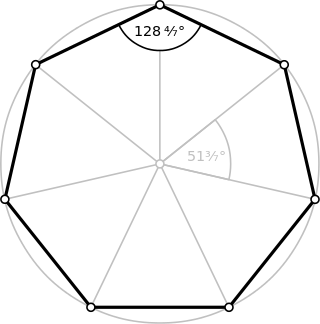
In mathematics, a field is a set on which addition, subtraction, multiplication, and division are defined and behave as the corresponding operations on rational and real numbers do. A field is thus a fundamental algebraic structure which is widely used in algebra, number theory, and many other areas of mathematics.
In mathematics, a finite field or Galois field is a field that contains a finite number of elements. As with any field, a finite field is a set on which the operations of multiplication, addition, subtraction and division are defined and satisfy certain basic rules. The most common examples of finite fields are given by the integers mod p when p is a prime number.

In mathematics, specifically abstract algebra, an integral domain is a nonzero commutative ring in which the product of any two nonzero elements is nonzero. Integral domains are generalizations of the ring of integers and provide a natural setting for studying divisibility. In an integral domain, every nonzero element a has the cancellation property, that is, if a ≠ 0, an equality ab = ac implies b = c.
In mathematics, a unique factorization domain (UFD) is a ring in which a statement analogous to the fundamental theorem of arithmetic holds. Specifically, a UFD is an integral domain in which every non-zero non-unit element can be written as a product of irreducible elements, uniquely up to order and units.
In mathematics, an irreducible polynomial is, roughly speaking, a polynomial that cannot be factored into the product of two non-constant polynomials. The property of irreducibility depends on the nature of the coefficients that are accepted for the possible factors, that is, the field to which the coefficients of the polynomial and its possible factors are supposed to belong. For example, the polynomial x2 − 2 is a polynomial with integer coefficients, but, as every integer is also a real number, it is also a polynomial with real coefficients. It is irreducible if it is considered as a polynomial with integer coefficients, but it factors as if it is considered as a polynomial with real coefficients. One says that the polynomial x2 − 2 is irreducible over the integers but not over the reals.
In algebra, a monic polynomial is a non-zero univariate polynomial in which the leading coefficient is equal to 1. That is to say, a monic polynomial is one that can be written as

In mathematics, especially in the field of algebra, a polynomial ring or polynomial algebra is a ring formed from the set of polynomials in one or more indeterminates with coefficients in another ring, often a field.
In mathematics, the (field) norm is a particular mapping defined in field theory, which maps elements of a larger field into a subfield.
In mathematics, the field trace is a particular function defined with respect to a finite field extension L/K, which is a K-linear map from L onto K.
In mathematics, finite field arithmetic is arithmetic in a finite field contrary to arithmetic in a field with an infinite number of elements, like the field of rational numbers.
In commutative algebra and field theory, the Frobenius endomorphism is a special endomorphism of commutative rings with prime characteristic p, an important class which includes finite fields. The endomorphism maps every element to its p-th power. In certain contexts it is an automorphism, but this is not true in general.
In mathematics, the Lasker–Noether theorem states that every Noetherian ring is a Lasker ring, which means that every ideal can be decomposed as an intersection, called primary decomposition, of finitely many primary ideals. The theorem was first proven by Emanuel Lasker (1905) for the special case of polynomial rings and convergent power series rings, and was proven in its full generality by Emmy Noether (1921).
In mathematics and computer algebra, factorization of polynomials or polynomial factorization expresses a polynomial with coefficients in a given field or in the integers as the product of irreducible factors with coefficients in the same domain. Polynomial factorization is one of the fundamental components of computer algebra systems.
In field theory, a simple extension is a field extension which is generated by the adjunction of a single element, called a primitive element. Simple extensions are well understood and can be completely classified.
In mathematics, particularly computational algebra, Berlekamp's algorithm is a well-known method for factoring polynomials over finite fields. The algorithm consists mainly of matrix reduction and polynomial GCD computations. It was invented by Elwyn Berlekamp in 1967. It was the dominant algorithm for solving the problem until the Cantor–Zassenhaus algorithm of 1981. It is currently implemented in many well-known computer algebra systems.
In mathematics, in the field of abstract algebra, the structure theorem for finitely generated modules over a principal ideal domain is a generalization of the fundamental theorem of finitely generated abelian groups and roughly states that finitely generated modules over a principal ideal domain (PID) can be uniquely decomposed in much the same way that integers have a prime factorization. The result provides a simple framework to understand various canonical form results for square matrices over fields.
In mathematics, the Dickson polynomials, denoted Dn(x,α), form a polynomial sequence introduced by L. E. Dickson (1897). They were rediscovered by Brewer (1961) in his study of Brewer sums and have at times, although rarely, been referred to as Brewer polynomials.
In mathematics, a permutation polynomial is a polynomial that acts as a permutation of the elements of the ring, i.e. the map is a bijection. In case the ring is a finite field, the Dickson polynomials, which are closely related to the Chebyshev polynomials, provide examples. Over a finite field, every function, so in particular every permutation of the elements of that field, can be written as a polynomial function.

In mathematics, an algebraic number field is an extension field of the field of rational numbers such that the field extension has finite degree . Thus is a field that contains and has finite dimension when considered as a vector space over .
In mathematics and computer algebra the factorization of a polynomial consists of decomposing it into a product of irreducible factors. This decomposition is theoretically possible and is unique for polynomials with coefficients in any field, but rather strong restrictions on the field of the coefficients are needed to allow the computation of the factorization by means of an algorithm. In practice, algorithms have been designed only for polynomials with coefficients in a finite field, in the field of rationals or in a finitely generated field extension of one of them.















